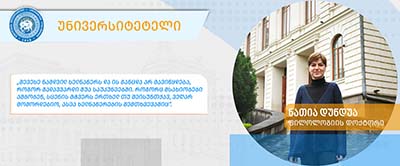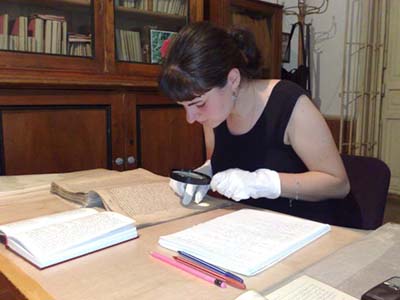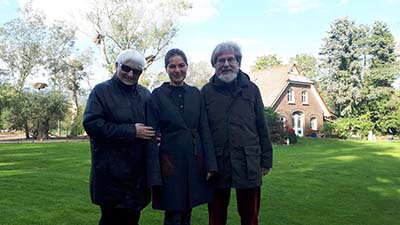 You may be wondering how a person fascinated by Eastern culture and history could end up as a researcher of medieval Christian philology. Or what can leave an unforgettable impression on a German Kartvelologist during her stay in Georgia? Or why is “thrill” more important than income in a profession?
You may be wondering how a person fascinated by Eastern culture and history could end up as a researcher of medieval Christian philology. Or what can leave an unforgettable impression on a German Kartvelologist during her stay in Georgia? Or why is “thrill” more important than income in a profession?
You will learn about all this from the story of Natia Dundua, a graduate of Tbilisi State University, who teaches at Ivane Javakhishvili Tbilisi State University (she leads the lectures and seminars on the history of Georgian palaeography and Georgian literary language of Professor Darejan Tvaltvadze) and at Ilia State University (lectures and seminars on Old Georgian). At the same time, she is a senior research fellow at the Korneli Kekelidze Georgian National Center of Manuscripts and an associate researcher at the G. Tsereteli Institute of Oriental Studies.
It all started very simply...
From the Colorful East to the Philology of the Medieval Christian East
I studied at the Tbilisi First Classical Gymnasium, where we had Persian lessons from the 3rd grade. My father was an Iranologist, and I considered this pleasant coincidence as a gift from God. In the 7th grade, we were taken on a trip to Iran, the colorful East made an indelible impression on me, and I decided to continue my studies in this direction. In 2008, I graduated from Tbilisi State University with a bachelor’s degree in Persian Language and Literature. In 2008, when I decided to continue my studies with a master’s degree, the Iranian Studies group was not formed, and God again sent me Ana Kharanauli, who at that time created the master’s program “Philology of the Medieval Christian East”. In this program, we were taught old Georgian, ancient Greek, old Armenian, Bible textology, paleography-codicology and many other things necessary to become a real professional.
Following the completion of my master’s degree in Georgia in 2010, I was awarded a DAAD scholarship that enabled me to pursue further studies with Professor Jost Gippert at Goethe University Frankfurt. Immediately after completing the program, I began working on a four-year project to create a parallel corpus of the Georgian Gospels, which meant placing all the important manuscripts of the Georgian Gospels one under the other in the unified Titus database (https://titus.uni-frankfurt.de/texte/etca/cauc/ageo/nt/ntkpl/ntkpl.htm).
After completing the project, Natia continued her work on her doctoral thesis at Goethe University Frankfurt and in 2018, she defended her doctoral thesis on the topic: “Georgian Translation of the Book of Tobit (Origin, Translation Technique)”.
“The Book of Tobit is a text of the Old Testament that was not included in the Jewish canon and is therefore referred to as a so-called apocryphal book. However, it is recognized as a canonical text by both the Greek and Georgian churches.
referred to as a so-called apocryphal book. However, it is recognized as a canonical text by both the Greek and Georgian churches.
The research revealed that the old Georgian translation of the Book of Tobit belongs to the third textual type of Greek, which has been preserved in only a few manuscripts in the Greek and Syriac languages, and even then it is incomplete. Notably, the Georgian version has fully preserved this textual form, rendering it of significant importance in the restoration of not only the Georgian text, but also the Greek and Syriac originals. I returned to Georgia in 2019, but since then I have had to participate in international conferences or other programs abroad several times a year. Two facts concerning the Georgian translation of Ecclesiastes are particularly gratifying: first, in 2012, Peter Gentry, the publisher of the Greek text of Ecclesiastes, asked me to compare the Georgian translation with Greek sources. The comparison showed that the Georgian translation of Ecclesiastes was made from Greek, and that its original must have come from an early group of the Egyptian textual tradition, giving the Georgian translation special significance for the history of the Greek text of Ecclesiastes. Consequently, in 2019, the Göttingen Septuagint Publication and Research Commission published Volume XI, 2, which constitutes a critical edition of the text of Ecclesiastes. Notably, this edition incorporates Georgian material for the first time among the Septuagint editions. Secondly, in 2023 I won the European Union competition entitled “Support to Georgia’s Researchers’ Mobility”. This program, which was implemented in Georgia with the support of DAAD, allowed me to work for a period of three months at the University of Helsinki on the project “The electronic synoptic edition of the Georgian translation of Ecclesiastes”, explains Natia.
German Kartvelologist with Unforgettable Impressions and Georgian Teachers
 I always say that I am happy because fate has sent me exceptional teachers at every stage of my life. Specialists of the level that taught me at Tbilisi State University, whether at the undergraduate or graduate level, are rarely found abroad. But, of course, I also had the opportunity to interact with many interesting professors abroad, the most precious of which is the memory of the German Kartvelologist Winfried Boeder, who, upon learning that I was in Germany, immediately invited me to his extraordinary house in Oldenburg, full of books in Georgian and other languages, where he lived with his wife Doris, with the following text: “I hope that one day you will visit us in Oldenburg: it is easier than moving from Tbilisi to Mestia, for example.” Every visit to the Boeders is unforgettable. During my last visit, Mr. Boeder told me the following: “I still remember the image I saw in the church in Gremi in 1974: I climbed up the rock, opened the church door and saw a guard sitting and reading something. It was nothing but “Kartlis Tskhovreba” (The Georgian Chronicles). Can you imagine that? You will probably never see something like that again… Georgia is built on such people!”
I always say that I am happy because fate has sent me exceptional teachers at every stage of my life. Specialists of the level that taught me at Tbilisi State University, whether at the undergraduate or graduate level, are rarely found abroad. But, of course, I also had the opportunity to interact with many interesting professors abroad, the most precious of which is the memory of the German Kartvelologist Winfried Boeder, who, upon learning that I was in Germany, immediately invited me to his extraordinary house in Oldenburg, full of books in Georgian and other languages, where he lived with his wife Doris, with the following text: “I hope that one day you will visit us in Oldenburg: it is easier than moving from Tbilisi to Mestia, for example.” Every visit to the Boeders is unforgettable. During my last visit, Mr. Boeder told me the following: “I still remember the image I saw in the church in Gremi in 1974: I climbed up the rock, opened the church door and saw a guard sitting and reading something. It was nothing but “Kartlis Tskhovreba” (The Georgian Chronicles). Can you imagine that? You will probably never see something like that again… Georgia is built on such people!”
Natia is currently working on publishing her dissertation as a book. In addition, she is involved in many projects, among which the project currently underway at the Septuagint Institute of the Göttingen Academy of Sciences and Humanities stands out.
“Within the framework of this project, an Editio critica maior of the Psalms is being prepared, which means that all sources of the Psalms must be used. In view of the completeness of the research, the Georgian should also be considered as an important source for the preparation of the critical text, which I have been asked to do by the project director, Felix Albrecht. The Septuagint Institute publishes the Greek translation of the Psalms using innovative technologies in accordance with the international standard for manuscript and textual research. The manuscripts and texts are processed through a special platform (https://sourceforge.net/projects/wfce-ote/), which allows the codicological-paleographic description of the manuscript and the transcription of the manuscript for subsequent collation (comparison of sources) to be considered in the publication of the data.
In addition, as part of the cooperation between the Institute of Oriental Studies and the University of Göttingen, I was invited to give a one-month lecture series on Georgian-Persian relations at the University of Göttingen in the summer,” says the researcher, who, in addition to her research, enjoys working with students, “because the pleasure experienced when one beholds the fruits of one’s labor is indescribable.”
Profession as a “thrill,” not a source of income
“Ramaz Chilaia taught us an introduction to literary studies at the university, and he once told us: You won’t.jpg) make any money with your profession, but it’s a “thrill” that no money can give you. I still live by this motto and have never regretted my choice. I advise everyone to think carefully when choosing a profession, to do what you really love, because doing something you don’t love for the rest of your life is a punishment. I remember that during my master’s degree, our supervisor, Ana Kharanauli, sent me, Natia Mirotadze, and Keti Gaboshvili on a business trip to the Kutaisi Historical Museum to work on manuscripts. It was there that I touched a real manuscript for the first time, and I will never forget the feeling of being transported back to the Middle Ages. As actors say, once you inhale the dust of the stage, you can’t get rid of it, and the same is true with manuscripts. I wish many students could experience this pleasure. I also want everyone to know where this treasure of our country is kept, to love it and to take care of it … “
make any money with your profession, but it’s a “thrill” that no money can give you. I still live by this motto and have never regretted my choice. I advise everyone to think carefully when choosing a profession, to do what you really love, because doing something you don’t love for the rest of your life is a punishment. I remember that during my master’s degree, our supervisor, Ana Kharanauli, sent me, Natia Mirotadze, and Keti Gaboshvili on a business trip to the Kutaisi Historical Museum to work on manuscripts. It was there that I touched a real manuscript for the first time, and I will never forget the feeling of being transported back to the Middle Ages. As actors say, once you inhale the dust of the stage, you can’t get rid of it, and the same is true with manuscripts. I wish many students could experience this pleasure. I also want everyone to know where this treasure of our country is kept, to love it and to take care of it … “
Finally, as a fourth-generation university graduate (my brother, parents, mother’s mother, and grandmother’s father also studied at TSU; my mother, Marine Ivanishvili, is an Associate Professor at the Institute of Theoretical and Applied Linguistics), I love and cherish it very much. I want it to remain an institution based on traditions, high standards, and progressive knowledge transfer.

 FACULTY OF EXACT AND NATURAL SCIENCES
FACULTY OF EXACT AND NATURAL SCIENCES
 FACULTY OF HUMANITIES
FACULTY OF HUMANITIES
 FACULTY OF SOCIAL AND POLITICAL SCIENCES
FACULTY OF SOCIAL AND POLITICAL SCIENCES
 FACULTY OF PSYCHOLOGY AND EDUCATIONAL SCIENCES
FACULTY OF PSYCHOLOGY AND EDUCATIONAL SCIENCES
 FACULTY OF ECONOMICS AND BUSINESS
FACULTY OF ECONOMICS AND BUSINESS
 FACULTY OF MEDICINE
FACULTY OF MEDICINE
 FACULTY OF LAW
FACULTY OF LAW



